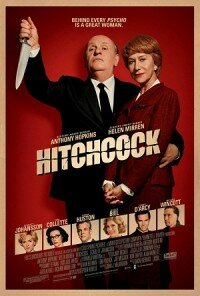Yes, Anthony Hopkins as Hitchcock borrows from Anthony Hopkins as Hannibal Lecter. Yes, both characters delight in sadism, “cutting up a few old touches” as they joked in Silence Of The Lambs.
Hitchcock, though, has to live just inside the line of decency. He can abuse women whom he wants to abuse (men scarcely register to him), verbally and spiritually. He can leave lasting marks on their psyches: Just ask Tippi Hedren. But he can’t step over the line. Maybe that stalling’s what drives him to gulp down solids and liquids. Booze for breakfast, booze for lunch, booze for dinner, and a fair number of between-meal snacks.
You have to give Hitch (he pointedly drops the “cock”) some credit for being a nice guy, though. No, you really have to at the risk of the whole show because here, unlike Silence Of The Lambs, they’re going for a conventional romance, and that means the two leads need likeableness. In the case of Helen Mirren, that’s no problem; still warmly smiling and sexy as hell, she drifts through the action on a puffy cloud, and the viewer understands her intentions are only the best, even if Hitch doesn’t.
Of course, the presence of a conventional love story doesn’t stop the filmmakers contratextualizing that with one of the most unconventional love stories presented in mainstream cinema. And that romance, of course, lies at the heart of Psycho. You won’t see much of Anthony Perkins onscreen as either himself or Norman Bates. (I told you men scarcely register to Hitch, although for cinematic purposes here, he identifies so strongly with Bates that he doesn’t need to think about him much.)
I do not agree with that school of thought stating that Scarlett Johansson has only one facial expression, but she does seem a touch more (oddly enough) animated, playing Janet Leigh. Of course, much of that comes at Hitch’s hands, or to be more precise, his sadistic voice. They’ve cleaned Hitch up, but they can’t grant him potency. Hannibal became a man of action the minute he popped those cuffs: Hitch can only watch.





